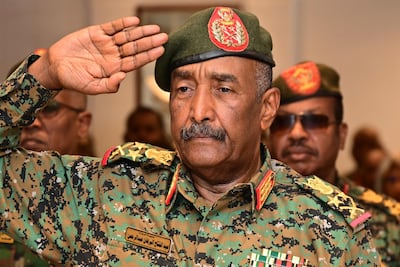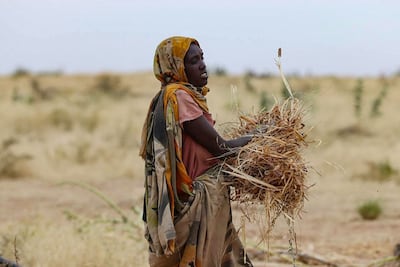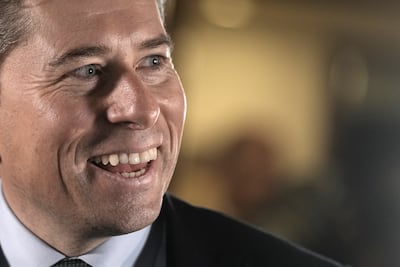A major offensive by the army and its allies in Sudan's capital appears to have slowed down in the face of stiff resistance by the rival paramilitary Rapid Support Forces (RSF), witnesses say, as the UN appealed on Monday for $6 billion to provide desperately needed aid to the country.
The stalemate in the capital comes as the RSF was preparing to announce the formation of a government in areas under its control, which stretch from parts of Khartoum and its sister cities, Bahri and Omdurman, to the vast Darfur region in the west and large swathes of Kordofan in the south-west.
A declaration of the proposed government was due to be announced in Kenya on Monday but the event has been put off until Tuesday, without explanation.
The RSF move follows comments made by army chief Gen Abdel Fattah Al Burhan last week that he intended to create a transitional government of technocrats to run the country until the war, now in its 23rd month, is over.
The prospect of Sudan having two rival governments is a source of alarm for many Sudanese who fear it would be a prelude to the break-up of the vast Afro-Arab nation, which lost about a third of its territory and most of its oil wealth 14 years ago when the mainly animist and Christian south seceded after two decades of civil war against the north.
Already, areas under army control in the capital, northern, eastern and central Sudan are using high denomination bank notes not available to parts of the country held by the RSF. Moreover, only pupils in army-held areas have sat their high school diploma exams.
The only functioning international airport in the country now is in Port Sudan on the Red Sea, where Gen Al Burhan, his top generals and military-backed administration are based.

Speaking to The National, witnesses in the capital said the army and its allied volunteers were engaged in intermittent but intense battles in Khartoum close to the Nile-side presidential palace and the commercial hub known as Al Souq Al Araby.
However, they said, neither side appears to have made any major headway for close to a week, with RSF snipers repulsing army attempts to advance.
The army and the volunteers have meanwhile been trying for days to throw the RSF out of Kaffouri, an upmarket district across the Nile from Khartoum in Bahri, where the nation's top politicians and the wealthiest once lived in mansions built on leafy streets.
Most of Bahri and Omdurman are now controlled by the army, but it is in Khartoum where the RSF is putting up stiff resistance, holding on tenaciously to the symbolically significant presidential palace, the city's only international airport, which is not functioning, a section of the armed forces headquarters and government ministries.
With neither side making any tangible changes there to the battle lines, Gen Al Burhan on Monday reaffirmed his resolve to keep fighting until the RSF is defeated.

Gen Al Burhan has already rejected several bids by foreign powers, including the US and regional heavyweight Saudi Arabia, to get the warring sides to the negotiating table.
"I have a clear message for the regional and international communities: 'Don't bother trying to interfere in the affairs of the Sudanese people,'" he stressed on Monday.
Meanwhile, the UN appeal reflected the dire conditions in Sudan caused by the war, which has killed tens of thousands and displaced about 12 million since it broke out in April 2023. About 26 million people are facing acute hunger in Sudan this year, with pockets of famine surfacing across the nation.
The appeal, jointly made by the UN humanitarian agency Ocha and refugee agency UNHCR, said of the 12 million displaced, about 3.5 million have fled the country.
“Sudan is a humanitarian emergency of shocking proportions,” UN humanitarian chief Tom Fletcher said in a statement. “Famine is taking hold. An epidemic of sexual violence rages. Children are being killed and injured. The suffering is appalling.”

“Today, one third of Sudan's entire population is displaced,” UNHCR chief Filippo Grandi said, highlighting that “the consequences of this horrific and senseless conflict spread far beyond Sudan's borders”.
The UN warned that without immediate funding, two thirds of refugee children would be denied access to primary education, “threatening an entire generation”.
Last week, the UAE pledged a further $200 million in humanitarian funding for Sudan, with Sheikh Shakhbout bin Nahyan, Minister of State at the Ministry of Foreign Affairs, saying the crisis in the country demands “immediate and collective action”.
The UAE, Ethiopia, the African Union and the Intergovernmental Authority on Development hosted a high-level humanitarian conference in Addis Ababa to mobilise urgent support for the Sudanese people.
Representatives of countries including France, Canada and the US joined international partners in calling for a ceasefire during Ramadan this year – expected to start at the beginning of next month – a call previously rejected by the Sudanese army.
The Sudan war is rooted in a struggle for power between Gen Al Burhan and his former ally, RSF commander Gen Mohamed Dagalo. The pair claim to be fighting for the benefit of the Sudanese people, with each promising to restore democratic rule and stay out of politics after free elections are held.


